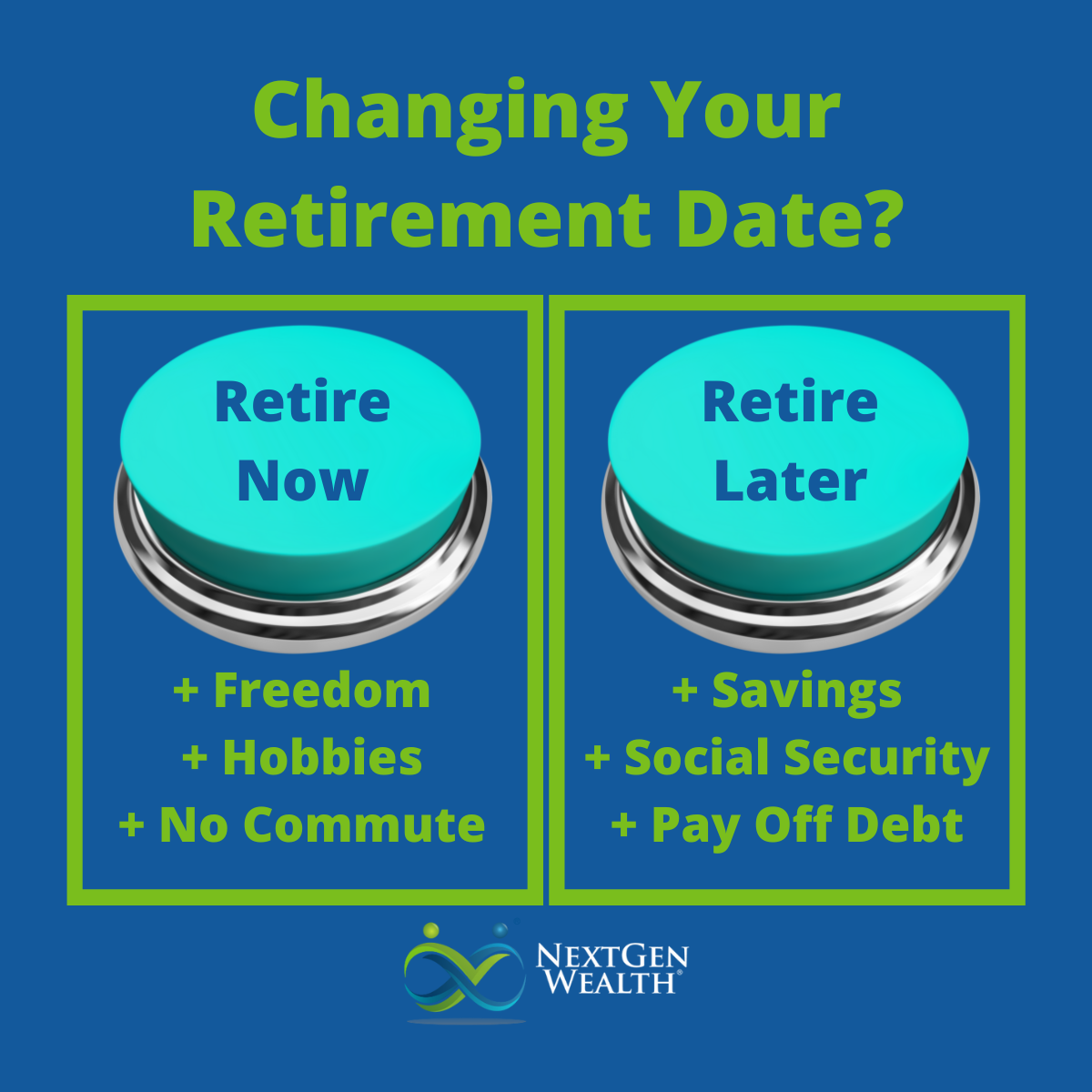Top 5 Things to Consider Before Setting a Date for Retirement

Setting your date to retire can be one of the most stressful decisions you’ll ever make. Maybe you’ve been anticipating this day for a long time - or dreading it. Retirement means different things to different people, but no matter what, you still need to prepare.
Let’s talk about the five things that you need to consider: what you are retiring to, current income versus retirement income, current expenses versus retirement expenses, having enough resources (money), and changes to your plan.
What You Are Retiring To
Possibly the biggest question is what are you retiring to? You might continue to work in some capacity. Maybe you’ll pursue your hobbies full-time. More than likely, you’ll change your preferences over time and that’s okay – it’s your retirement!
What Does Retirement Mean to You?
The biggest thing is that you can find purpose and meaning in retirement. You worked hard so you can enjoy your retirement. If you feel like that will take big changes, then you’ll want to plan those out before you set a date for retirement.
Establishing New Habits and Routines
Establishing new habits and routines will be critical in retirement. I often suggest doing some sort of trial run to get a feel for how things will be. This can be an extended “staycation” or just some time off to travel.
Chances are that some of your friends and family will still be working, so consider how your relationships might change in retirement. This can be a source of stress if you haven’t started diversifying your network of friends already.
Leaving Room for Unanticipated Changes
Many of the best stories in life have plot twists. Your retirement is likely to have a few twists and turns as well. Be prepared for things to change over time and think about how you’ll work through unplanned changes.
Current Expenses Versus Retirement Expenses
Even if you know exactly what you want to do in retirement, it doesn’t matter unless you have enough money. You’ll want to look at expenses that are likely to increase and decrease in retirement. This will help you understand what your spending needs will be.
Expenses Likely to Increase in Retirement
People tend to spend more on entertainment and travel. You have more time for both now, so that makes sense. Also, medical expenses increase over time.
Medical expenses are difficult to predict. To give you an idea, look at your hypothetical, worst-case-scenario medical expenses. It’s a good idea to adjust your emergency savings to cover unexpected medical bills - at least up to your full annual deductible.
Expenses Likely to Decrease in Retirement
Some of the expenses likely to decrease are saving for retirement, housing, childcare, and business related expenses. This will vary on the occupation you held (or still hold) and where you are in the country.
Housing costs can vary widely, so this may have more or less of an impact on your expenses. If you’re still paying on a mortgage in retirement, that’s an important expense to consider. If your house is paid off, then that’s a major expense you won’t have anymore.
Overlapping Expenses Pre and Post Retirement
There may be some expenses that have some overlap. For instance, you might plan to travel more right away, but your mortgage won’t be paid off for a few years. Identifying these overlapping expenses is important – especially if your retirement income can’t cover the overlap.
Current Income Versus Retirement Income
Your income is going to change in retirement. We expect that to happen. However, it can still be a shock if you’re not prepared.
You might still be able to work part-time if needed. This might mean that you can retire a little earlier because you can turn on additional income if you need to. Keep in mind, your earning potential will likely decrease over time as well.
Streams of Income in Retirement
Looking at how to receive income from a variety of sources is important. You may have a pension, a large nest egg (401k, IRA, etc), real estate income, part-time employment, and Social Security benefits. We want to get all these to work in concert to provide you income when you need it.
Planning What to Use and When
Depending on your situation, it may be possible to optimize income sources for taxes. The main thing to consider is when each source will be the most tax efficient. Make sure you plan out income if you’re going to employ tax saving strategies.
For instance, you might adjust how much you take in distributions to keep taxes and Medicare premiums lower. If tax laws change, you might be able to adjust your withdrawals temporarily to take advantage.
Estate Planning Considerations
Estate planning should happen early and be revisited periodically. You also might want to spend down assets in a particular order to reduce your taxes and maximize an inheritance for your heirs.
Do You Have Enough Resources?
Determining if you have enough money to retire is kind of important. Okay, it’s really important! This is bit of a trick question, but we can get some pretty good estimates of how much money you will need. Once we identify income, goals, and expenses, we can project best and worst-case scenarios.
Planning for the Worst
Unfortunately, bad things happen to good people. We must be prepared. This includes things like higher inflation, bad market conditions, a health scare, or even war.
Failing to plan for catastrophic events will not prevent them. On the contrary, planning for them will make you better prepared whether they happen or not.
Changing Insurance Needs
As you enter retirement, the risks you face will change. There might not be anyone who needs your income to support them anymore, so life insurance needs may be different.
You should consider the cost of long-term or nursing care too. Having adequate insurance for your home is still important as well. Now that you have accumulated assets, adding an umbrella policy may be needed for additional protection.
Hoping for the Best
Things might turn out much better than you expected. I hope they do! Regardless, you do need to plan to enjoy life in retirement too. This means ensuring you have a plan for any excess money and resources after you’re done with them.
What If Your Plan Changes?
Don’t worry, it will. Life is not a portrait on the wall; it’s constantly in motion. You have the right to change course and you might have to “roll with some punches” too.
If you need to adjust along the way, that’s perfectly normal. There are generally three main levers you can pull: save more, spend less, or change your goals. The main thing is that you can evaluate and understand each decision.
Under the umbrella of saving more, you can also adjust your retirement date. If you decide to retire later, you gain time to accumulate more retirement savings, pay down debt, or gain more in Social Security benefits.

Final Considerations
Overall, there is a lot to consider when you’re picking a date for retirement. No matter what, you always have some choices. If this all feels overwhelming, that’s normal.
You’re preparing for one of the biggest life transitions you’ll ever make. If you want help or just need to know your options, don’t hesitate to reach out!


